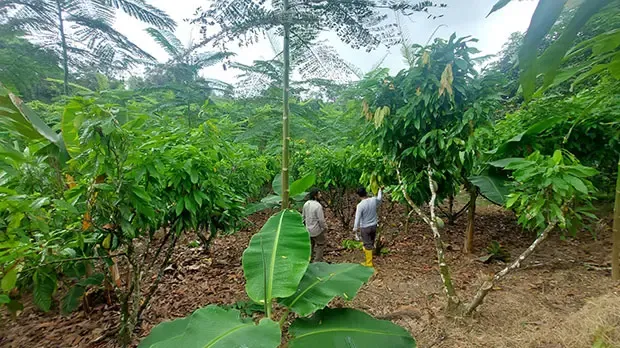The consortium is co-funded by the German Federal Ministry for Economic Cooperation and Development (BMZ). International NGO Rikolto is working alongside ofi (olam food ingredients) leading its implementation of sustainability programmes. The project in Ecuador seeks to address the impact of unpredictable weather conditions on growing cocoa by training 2,800 farmers in climate-smart agriculture.
According to a recent report by the Ecuadorian Ministry of Agriculture and Livestock, climate change poses a significant threat to the 1.7 million Ecuadorians who depend on cocoa. Approximately 60% of cocoa farmers rely on cocoa as their main source of income.
The low-carbon agriculture project aims to help farmers create more resilient livelihoods and increase the efficiency of their cocoa production. By implementing agroforestry, a regenerative farming approach, cocoa can grow alongside other plant species.
The technique can help farmers improve cocoa yields, generate additional income from other planted crops, sequester carbon, and promote biodiversity.
Paula Andrea Rueda Peña, sustainability manager ofi Ecuador, said: “Together with GIZ and Rikolto, we’re strengthening the sustainable cocoa supply chain in Ecuador, helping to make it more resilient to climate change while lowering its environmental footprint.
“By introducing this low-carbon agriculture approach in our sustainability programmes and those we deliver for our customers, we’re supporting smallholder farmers to innovate the way they manage their farms to boost cocoa productivity and helping them on a path towards achieving a living income.
“This supports the aims of our overarching sustainability strategy, Choices for Change, to drive climate action and positive change across farming communities.”
Six hundred tailored coaching sessions or 'field schools' will deliver training. Farmers, at least 20% of whom will be women, will be taught to integrate sustainability principles and agricultural standards into their existing farming approaches, helping them boost cocoa productivity and build climate resilience.
The project will also produce 40,000 plants of the rare and native Nacional cocoa variety for distribution. These plants will be housed in an organic cocoa production community nursery.
It will also generate insights by leveraging ofi’s award-winning AtSource sustainability management system. Best practices and lessons learned will be shared with national authorities, including the Ministry of Agriculture and Environment, to help inform national climate policy.
Jose Luis Cueva, Cocoa Project Coordinator, Rikolto, said: “Sustainable implementation through climate-smart cocoa agroforestry systems will generate a triple impact in terms of improving production, addressing the ravages of climate change and ensuring a living income for producers. At Rikolto, we believe that capacity building, innovation and sustainability are key pillars for improving the livelihoods of cocoa producers.”
- The project is aligned with Ecuador's REDD+ Action Plan "Forests for Good Living" 2016-2025.
cocoaradar.com is:
- Official Media Partner - World Cocoa Foundation Partnership Meeting in São Paulo, Brazil, 19-20 March 2025.
- Official Media Partner - Amsterdam Sustainable Cocoa Conference, Chocoa, 4-9 February 2025.
- 'From Our Desk. To Yours'
- Sign-up here for free and upgrade to an annual plan with a 35% discount

